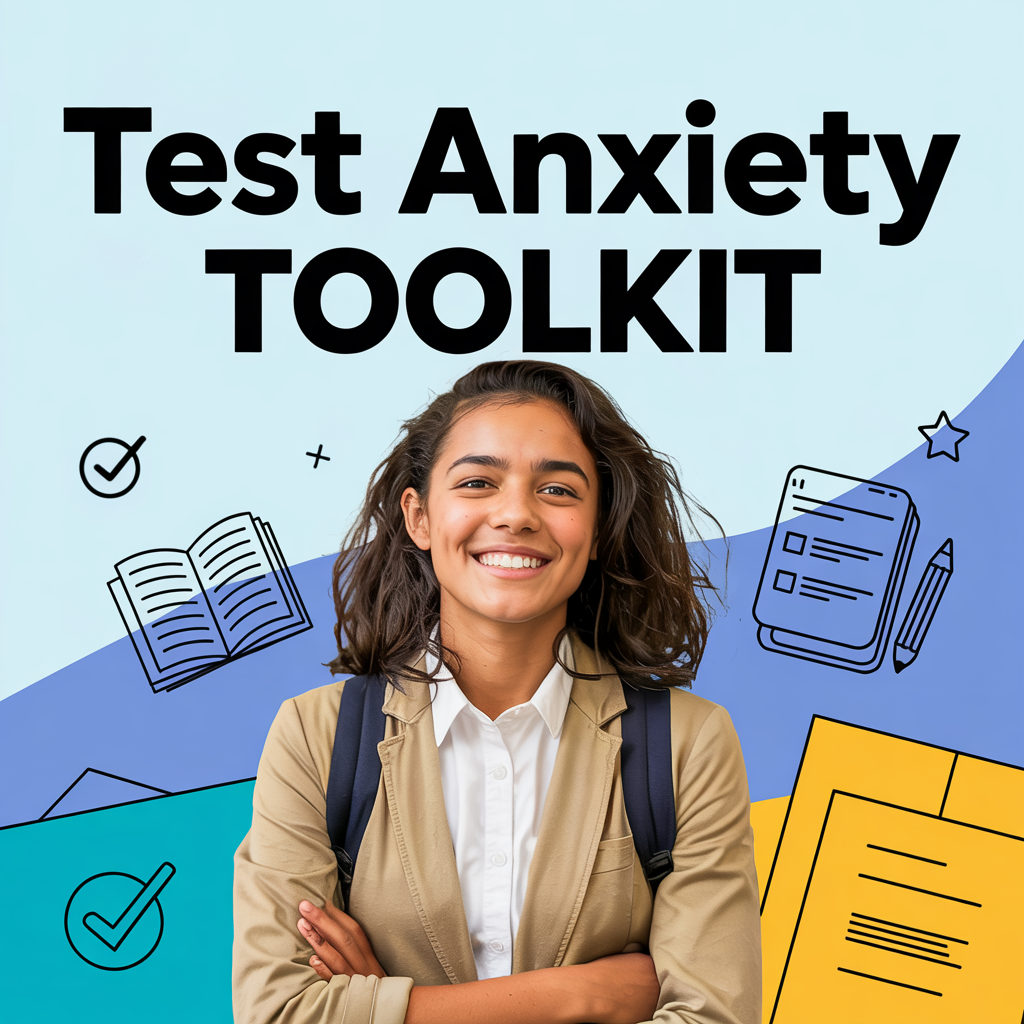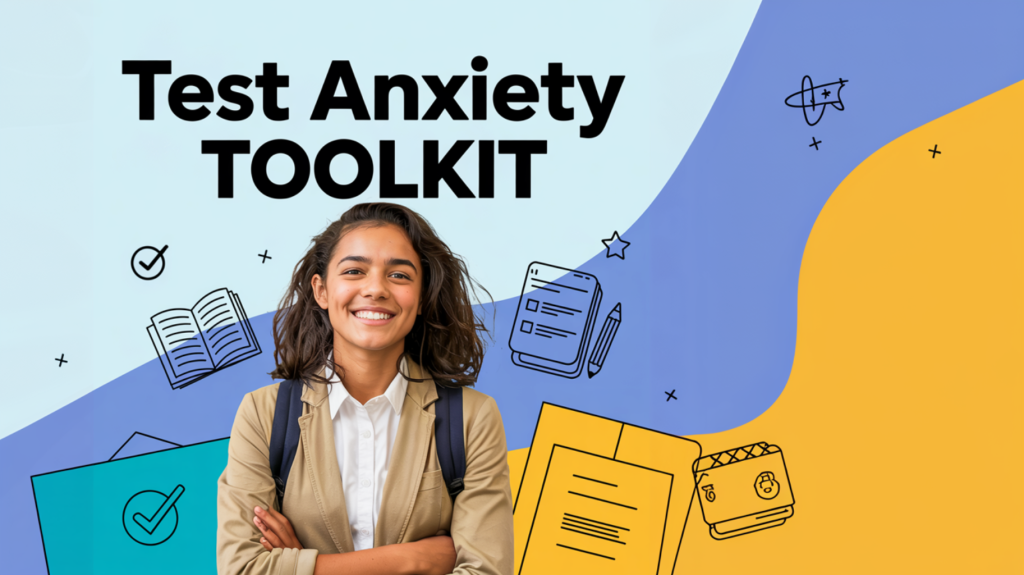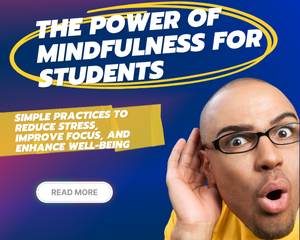Test Anxiety Toolkit: Proven Techniques to Stay Calm, Focused, and Confident During Exams

Test anxiety is a common experience. Many students feel it before or during exams. It’s that mix of nervousness, fear, and panic that can make it hard to focus. Even if you’re prepared, test anxiety can affect your performance. But it doesn’t have to control you. This “Test Anxiety Toolkit” provides proven techniques. It will help you stay calm, focused, and confident during exams. Learn to manage your anxiety and ace those tests.

Understanding Test Anxiety
Test anxiety is more than just feeling nervous. It’s a real psychological and physiological response. It happens when you’re under the stress of exams.
Symptoms of Test Anxiety: Test anxiety can show up in different ways:
- Cognitive Symptoms: These include worry, fear of failure, negative self-talk, difficulty concentrating, and racing thoughts. You might also experience mental blanking.
- Physical Symptoms: You might notice increased heart rate, rapid breathing, sweating, trembling, stomach upset, headaches, or muscle tension.
- Emotional Symptoms: Anxiety, fear, panic, irritability, nervousness, and feeling overwhelmed are common.
Causes of Test Anxiety: Several things can cause test anxiety:
- Pressure to Perform: High expectations from yourself, parents, or teachers can create a lot of pressure.
- Fear of Failure: Worrying about failing the test and the consequences can trigger anxiety.
- Lack of Preparation: Sometimes, feeling unprepared can make anxiety worse.
- Past Negative Test Experiences: If you’ve had bad experiences with tests in the past, it can trigger anxiety.
- Perfectionism: Wanting to be perfect and fearing mistakes can also lead to test anxiety.
Managing test anxiety starts with preparation and self-confidence. Platforms like Cirkled In help students stay organized and track achievements, making test day feel a little less overwhelming.
Preparation Strategies: Your Foundation for Confidence
Being well-prepared is key to reducing test anxiety. When you feel confident in your knowledge, you’re less likely to feel anxious.
- Thorough Studying: Prepare thoroughly for the test. The better prepared you are, the more confident you’ll feel.
- Practice Tests and Review: Take practice tests and review materials. This helps you get familiar with the test format and content.
- Organize and Plan Study Time: Create a study schedule and break down study material into manageable chunks. Being organized can reduce feelings of overwhelm.
Mindfulness and Relaxation Techniques: Calm Your Nerves
Mindfulness and relaxation techniques can help calm your nervous system. They can also reduce the physical symptoms of anxiety.
- Deep Breathing Exercises: Practice deep, slow breathing exercises. Do this to calm your nervous system and reduce anxiety. Use deep breathing before and during the test if you need to.
- Progressive Muscle Relaxation: Use progressive muscle relaxation techniques. This can help release muscle tension and physical anxiety symptoms.
- Mindfulness Meditation: Practice mindfulness meditation regularly. This can improve your focus, reduce worry, and increase self-awareness.
Positive Self-Talk and Cognitive Restructuring: Shift Your Mindset
Your thoughts play a big role in test anxiety. Changing negative thought patterns can make a big difference.
- Identify Negative Thoughts: Recognize and identify negative thoughts and self-talk. These thoughts fuel your test anxiety. Examples are, “I’m going to fail,” or “I’m not smart enough.”
- Challenge Negative Thoughts: Challenge these negative thoughts and replace them with positive and realistic self-talk. Try saying things like, “I have prepared well,” “I can do this,” or “It’s okay to make mistakes.”
- Focus on Your Strengths: Remind yourself of your strengths, past successes, and positive qualities.
- Visualize Success: Visualize yourself taking the test calmly and confidently. Imagine answering questions successfully and achieving a good outcome.
- Positive Self-Affirmations: Use positive self-affirmations to build self-confidence. Affirmations like, “I am prepared,” “I am capable,” or “I am confident” can be helpful.
Exam Day Strategies: Stay Focused and Perform Your Best
What you do on exam day matters. These strategies can help you stay focused and perform your best.
- Arrive Early and Get Settled: Arrive at the testing location early. This helps you avoid rushing and allows you to get settled before the test begins.
- Read Instructions Carefully: Read test instructions thoroughly before starting. This helps you avoid confusion and errors.
- Time Management During the Test: Pace yourself during the test. Allocate time for each section. Don’t spend too much time on any one question at the beginning. Focus on questions you know well to start. This builds confidence and momentum. If you find a difficult question, don’t panic. Take a deep breath, refocus, and remind yourself that you prepared. Reframe challenges as opportunities to learn and grow.
Action Step
Identify your personal test anxiety triggers and symptoms. Choose 3-5 techniques from the toolkit above. Practice and use them before and during your next exam. Explore Cirkled In’s wellness resources for more help. Create your personalized exam day calm toolkit.
Final Thought : Test Anxiety Toolkit: Crush Exam Stress & Ace Your Tests
Test anxiety is common, but it is manageable. With the right techniques and support, you can conquer test fear. Stay calm and focused during exams. Truly demonstrate your knowledge and potential.
Need more tips on college applications, scholarships, or just how to survive this whole process? Cirkled In has your back—check out Cirkled In resources to help you through every step of your college journey!



0 Comments